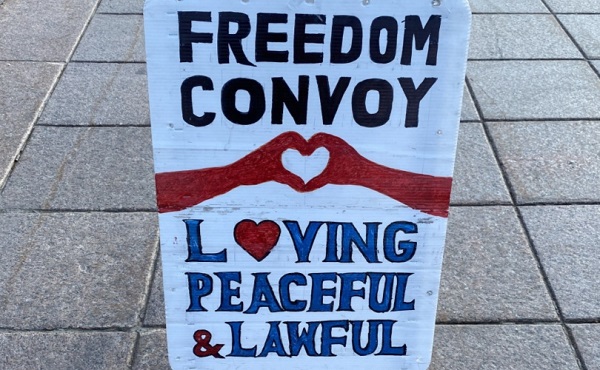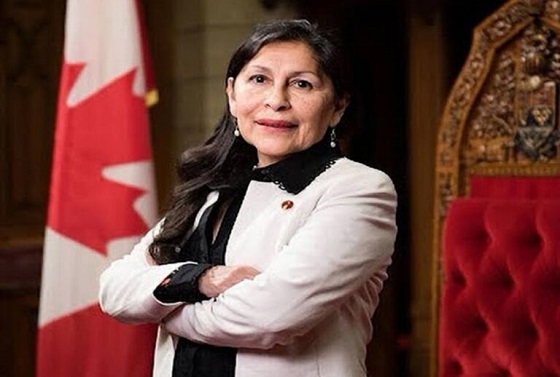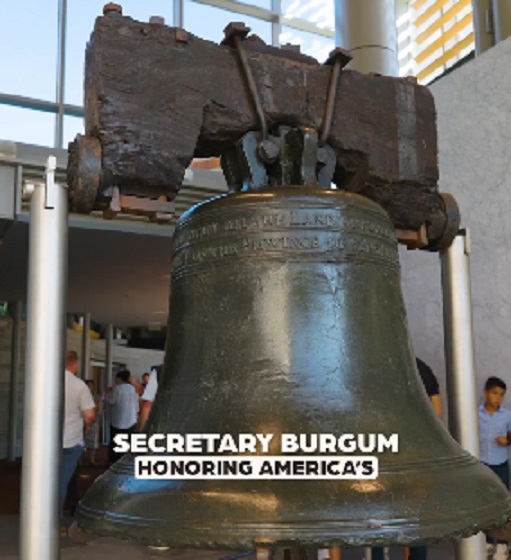Censorship Industrial Complex
When Did Traditional Values Become Hate Speech?

From the Frontier Centre for Public Policy
By Lee Harding
This smear campaign misrepresents peaceful dissent as dangerous radicalism, ultimately undermining trust in institutions and eroding civil debate. Ordinary Canadians are being branded as extremists for holding traditional values.
A disturbing trend has taken hold in Canada and across the Western world, where freedom-lovers and conservatives are categorized as extremists and potential terrorists.
Another headline-grabbing example took place on July 8 when RCMP spokeswoman Staff Sgt. Camille Habel told a CBC interviewer about an alleged militia plot to seize land in Quebec. She said if someone “believed in equal gender rights” but suddenly leaned towards “traditional values … that might be a sign that they’re becoming more extremist.”
Alas, some prominent people have gone so far left that traditional values are “far right” to them. Consider a 2021 report by the House of Commons Standing Committee on Public Safety and National Security. The document said “Ideologically motivated violent extremism [IMVE]… represents a societal issue requiring a whole-of-government approach.”
The document warned that since the pandemic, “IMVE activity has been fueled by an increase in extreme anti- authority and anti-government rhetoric often rooted in the weaponization of conspiracy theories. IMVE influencers promote misinformation and action, including violence.”
The report complained that some witnesses to the committee did not embrace the IMVE term, and instead used phrases such as the “far right” or the “far-right ecosystem.” Here, conservatives, conspiracy theorists and potential terrorists are one big, bad blog.
The tactic is old. In 1943, a Communist directive to American activists advised, “When certain obstructionists become too irritating, label them after suitable buildups as fascist or Nazi or anti-semitic, and use the prestige of anti-fascist and tolerance organizations to discredit them. In the public mind, we constantly associate those who oppose us with those names which already have a bad smell. The association will, after enough repetition, become fact in the public mind.”
This misrepresentation worked well against the Freedom Convoy. One mysterious person with a Nazi flag was enough to dismiss thousands of people as dangerous fascists. But spurious judgments like these malign many good people. This leads to misguided opposition against people who want to uphold Canada, not tear it down.
Trans-activists have their own form of name-shaming. They call out TERFs, meaning trans-exclusive radical feminists. These so-called TERFs believe that biological males have no place in women’s shelters, prisons and sports. This kind of disparagement is all too common. In September 2023, Canadian labour leaders and at least one researcher from a major university joined in a Zoom call to strategize against the 1 Million March 4 Children, a nationwide protest against transgender ideology in schools. A leaked video of the Zoom call showed these leaders and activists using terms like “fascist,” “intolerance,” “hate group,” “transphobic” and “homophobic” against parents and other citizens who wanted ideological concepts on gender kept out of school.
Meanwhile, the Canadian Anti-Hate Network (CAHN) blacklisted Campaign Coalition for Life as a “hate movement” after receiving $640,000 from the federal government to compile a list of allegedly hateful organizations and people.
“We define ‘hate-promoting’ to refer to ideologies, groups, movements and individuals which target members of protected groups,” explained the CAHN booklet entitled 40 Ways to Fight the Far-Right; CAHN even hosts a one-hour workshop that lays out “the intersection between hate, the far right, and conspiracy theories.”
This mirrors the United States where the left-leaning Southern Poverty Law Centre (SPLC) first made a list of bad organizations in 1990. Since 2000, the organization has compiled a “hate map” of these groups, which now number 835. As one example, SPLC calls the Family Research Council an “extremist” “hate group” due to their pro-life, pro-traditional marriage stances.
During Barack Obama’s second term as president, the Department of Defense (DoD) incorporated SPLC assessments into its training on domestic terrorism, leading to undue smears. In 2013, a DoD training presentation at Fort Hood, Texas, listed “Evangelical Christianity,” “Catholicism” and “Tea Party” as fostering extremism. In 2014, soldiers at Fort Bragg in North Carolina were told similar things about pro-gun and pro-life organizations.
In 2015, watchdog organization Judicial Watch openly called on the DoD to stop relying on the “anti-Christian” SPLC for its definitions, saying the group itself was hateful.
A teaching module presented to 9,100 soldiers at Fort Liberty through 2024 labelled National Right to Life and Operation Rescue as potential terrorist threats. Congressional Republicans protested this politicization of military training. In response, an army spokesperson echoed disclaimers made 10 years ago, saying the slides were not policy and were improperly vetted.
In July 2025, Army Secretary Dan Driscoll called it a “grievous error” to equate conservative groups with terrorists and vowed it would never happen again. Unfortunately, Canadians have no such assurances.
Lee Harding is a research fellow with the Frontier Centre for Public Policy.
Censorship Industrial Complex
UK Government “Resist” Program Monitors Citizens’ Online Posts

Alberta
Alberta bill would protect freedom of expression for doctors, nurses, other professionals

From LifeSiteNews
‘Peterson’s law,’ named for Canadian psychologist Jordan Peterson, was introduced by Alberta Premier Danielle Smith.
Alberta’s Conservative government introduced a new law that will set “clear expectations” for professional regulatory bodies to respect freedom of speech on social media and online for doctors, nurses, engineers, and other professionals.
The new law, named “Peterson’s law” after Canadian psychologist Jordan Peterson, who was canceled by his regulatory body, was introduced Thursday by Alberta Premier Danielle Smith.
“Professionals should never fear losing their license or career because of a social media post, an interview, or a personal opinion expressed on their own time,” Smith said in a press release sent to media and LifeSiteNews.
“Alberta’s government is restoring fairness and neutrality so regulators focus on competence and ethics, not policing beliefs. Every Albertan has the right to speak freely without ideological enforcement or intimidation, and this legislation makes that protection real.”
The law, known as Bill 13, the Regulated Professions Neutrality Act, will “set clear expectations for professional regulatory bodies to ensure professionals’ right to free expression is protected.”
According to the government, the new law will “Limit professional regulatory bodies from disciplining professionals for expressive off-duty conduct, except in specific circumstances such as threats of physical violence or a criminal conviction.”
It will also restrict mandatory training “unrelated to competence or ethics, such as diversity, equity, and inclusion training.”
Bill 13, once it becomes law, which is all but guaranteed as Smith’s United Conservative Party (UCP) holds a majority, will also “create principles of neutrality that prohibit professional regulatory bodies from assigning value, blame or different treatment to individuals based on personally held views or political beliefs.”
As reported by LifeSiteNews, Peterson has been embattled with the College of Psychologists of Ontario (CPO) after it mandated he undergo social media “training” to keep his license following posts he made on X, formerly Twitter, criticizing Trudeau and LGBT activists.
He recently noted how the CPO offered him a deal to “be bought,” in which the legal fees owed to them after losing his court challenge could be waived but only if he agreed to quit his job as a psychologist.
Early this year, LifeSiteNews reported that the CPO had selected Peterson’s “re-education coach” for having publicly opposed the LGBT agenda.
The Alberta government directly referenced Peterson’s (who is from Alberta originally) plight with the CPO, noting “the disciplinary proceedings against Dr. Jordan Peterson by the College of Psychologists of Ontario, demonstrate how regulatory bodies can extend their reach into personal expression rather than professional competence.”
“Similar cases involving nurses, engineers and other professionals revealed a growing pattern: individuals facing investigations, penalties or compulsory ideological training for off-duty expressive conduct. These incidents became a catalyst, confirming the need for clear legislative boundaries that protect free expression while preserving professional standards.”
Alberta Minister of Justice and Attorney General Mickey Amery said regarding Bill 13 that the new law makes that protection of professionals “real and holds professional regulatory bodies to a clear standard.”
Last year, Peterson formally announced his departure from Canada in favor of moving to the United States, saying his birth nation has become a “totalitarian hell hole.”
-

 Business2 days ago
Business2 days agoBlacked-Out Democracy: The Stellantis Deal Ottawa Won’t Show Its Own MPs
-

 Agriculture2 days ago
Agriculture2 days agoHealth Canada pauses plan to sell unlabeled cloned meat
-

 Crime1 day ago
Crime1 day agoB.C.’s First Money-Laundering Sentence in a Decade Exposes Gaps in Global Hub for Chinese Drug Cash
-

 Crime1 day ago
Crime1 day agoFBI Seizes $13-Million Mercedes Unicorn From Ryan Wedding’s Narco Network
-

 Banks1 day ago
Banks1 day agoThe Bill Designed to Kill Canada’s Fossil Fuel Sector
-

 International2 days ago
International2 days agoAmerica first at the national parks: Trump hits Canadians and other foreign visitors with $100 fee
-

 armed forces1 day ago
armed forces1 day ago2025 Federal Budget: Veterans Are Bleeding for This Budget
-

 Business2 days ago
Business2 days agoFederal major projects list raises questions







